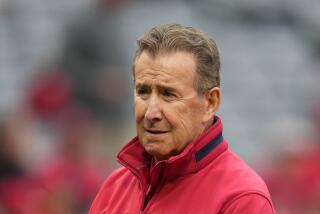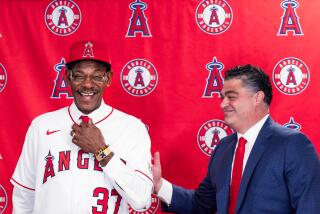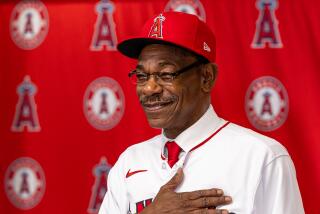Phillies GM Ruben Amaro Jr. is not afraid to take big risks
- Share via
Reporting from Baltimore -- Ruben Amaro Jr. was hired as general manager of the Philadelphia Phillies two weeks after the team celebrated the second World Series victory in franchise history.
He replaced Pat Gillick, who was voted into the Hall of Fame two years later.
Talk about a tough act to follow.
“I thought to myself, ‘OK, this is a pretty good situation. Just don’t screw it up,’” Amaro says nearly three years later.
He’s done better than that. Backed by ownership that supported a $60-million payroll jump over the last two seasons, Amaro has turned the Phillies into the winningest team in baseball.
On Wednesday, Philadelphia clinched a playoff berth for a fifth consecutive year and the team is on pace to shatter the 128-year-old franchise record for victories in a season. The Phillies have made it to the National League Championship Series each of the last three seasons and advanced to the World Series in Amaro’s first year as GM, losing to the New York Yankees in six games.
Amaro readily credits Gillick and Ed Wade, another former general manager, with laying the foundation for that success. Under their direction, the Phillies drafted or signed Chase Utley, Ryan Howard, Cole Hamels, Carlos Ruiz and Shane Victorino, the core of the championship teams.
“I inherited a great team,” Amaro says. “I’ve benefited from some of their great decisions. We’ve just tried to add on.”
Many of Amaro’s moves have been bold, drawing big headlines. In each of his three seasons, the Phillies have made major deals at the non-waiver trade deadline, acquiring Cliff Lee in 2009, Roy Oswalt in 2010 and Hunter Pence this season. He also signed free agents Pedro Martinez, Chan Ho Park, Placido Polanco, Wilson Valdez, Jose Contreras and Raul Ibanez — all key contributors — and worked more than six months on the trade that eventually brought Cy Young Award winner Roy Halladay to Philadelphia before the 2010 season.
He also traded Lee away to clear salary space for Halladay, an unpopular move that wasn’t fully forgiven until Lee chose to leave money on the table in Texas and New York and return to Philadelphia as a free agent last winter.
“They went nuts when I traded Cliff Lee,” Amaro says. “I thought that was the right thing to do because we benefited from getting what we thought was the best pitcher in baseball in Roy Halladay.
“One thing that I’ve learned from Pat is that you can’t be afraid to make a mistake. And if you make a mistake, you try to rectify that mistake somehow.”
A skeptic might say that’s easier to do when you have a payroll of $173 million, the second highest in baseball. Yet many of Amaro’s signings may prove to be relatively thrifty over time. For example, if Amaro hadn’t signed Howard to a five-year extension last year, the first baseman would have entered a lucrative free-agent market this winter alongside Albert Pujols and Prince Fielder, where he almost certainly would have cost millions more to re-sign.
Amaro also has Halladay and Lee locked up through at least 2014. Among the Phillies’ regular position players, only Ibanez and shortstop Jimmy Rollins are not under club control after this season. Of the starting pitchers, only Oswalt could leave as a free agent — assuming the club doesn’t pay $16 million to keep him.
“We’re overspent,” Amaro admits. “People think that because we have a sellout every night that we’re totally flush. That’s not the case. Our ownership group, our partners … they are committed to keeping this team together. And it’s not a situation where it’s at all costs. But there’s an argument that they’ve gone well overboard to do that.”
If Amaro had even a fraction of his success working in New York or Boston, they might have erected a statue of him outside the ballpark. In famously fickle Philadelphia, where Santa Claus was once pelted with snowballs at an Eagles football game, Amaro is just happy he hasn’t been hung in effigy.
But having spent his whole life in baseball — he is the son of a major leaguer, was a Phillies bat boy for four years, a big league outfielder for eight seasons and a front-office executive since 1999 — Amaro understands the sport’s law of averages enough to know nobody bats 1.000 forever.
When he took the job as general manager he sat his grade-school-aged daughters, Andrea and Sophia, down and told them that “there’s going to be a time, and it could be very, very soon, when people are just not going to like dad.”
That hasn’t happened yet.
“I pinch myself every single morning,” Amaro says. “We talk about this a lot. It’s way better to be lucky than good. And we’ve been very, very fortunate.”
More to Read
Go beyond the scoreboard
Get the latest on L.A.'s teams in the daily Sports Report newsletter.
You may occasionally receive promotional content from the Los Angeles Times.











